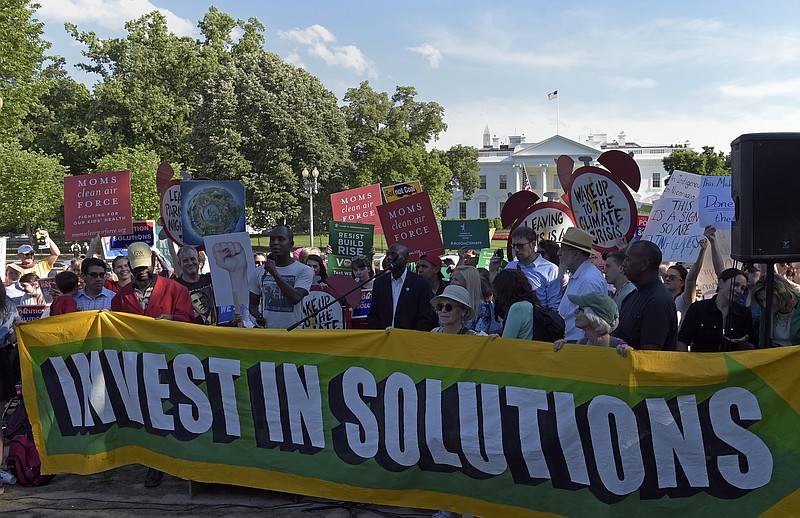America last.
That's what President Donald Trump's decision to pull the United States out of the Paris Climate Agreement means.
America, history's largest producer of greenhouse gas emissions, is now in the company only of Syria and Nicaragua - previously the only two countries in the world not to be part of the agreement. Nicaragua declined because its leaders thought the agreement wasn't tough enough, and Syria is too war-torn to think about climate change.
Beyond our grave concern for the planet as those gases prompt the rapid warming of the Earth, we believe Trump's action reaffirms his lack of a good business brain - the one he claims to possess.
If he had even a scintilla of business acumen, he would recognize the folly of ceding to China or others what could be our world leadership in building entrepreneurial opportunities and sales in the fields of alternative energies and fuels, along with the infrastructures to support them.
What is particularly sad is that he fails to see what could really put American first. Compared with fossil fuel technologies, which are typically mechanized and capital intensive, the renewable energy industry is more labor-intensive. This means that, on average, more jobs are created for each unit of electricity generated from renewable sources than from fossil fuels, according to research by the Union of Concerned Scientists.
Even in 2012 - five years ago - there were only a total of 137,650 permanent coal-related jobs and 806,831 oil and gas jobs nationwide, according to the U.S. Department of Labor. By contrast, there were 3.4 million green jobs in 2011, and a 2015 study found 7.7 million.
Instead, Trump - in an incredibly dark and wandering speech that hearkened back to his horrible inauguration line about "American carnage" - cited a disputed conservative study that claims the Paris agreement would cost America 2.7 million jobs by 2025.
"It is time to put Youngstown, Ohio; Detroit, Mich.; and Pittsburgh, Pa., along with many, many other locations within our great country, before Paris, France," Trump said. "It is time to make America great again."
The pact is about America and all of the Earth, not Paris. Paris is the city where the agreement was reached.
Since there are many more jobs in the renewable energy industry than in the fossil fuel industry, how does pulling U.S. support from the pact put Youngstown, Detroit and Pittsburgh ahead? Apparently Trump thinks his supporters there are too dumb to learn skills for the renewable energy field.
Trump based his withdrawal decision on the fact that America would be paying "billions and billions and billions" of dollars to other countries under the deal, and he termed it a redistribution of American wealth to other countries. In reality, the Obama administration pledged $3 billion to an international fund meant to aid the hardest-hit countries. Only $1 billion of that had been transferred to the fund by the time Trump took office on Jan. 20.
Congress may have the last word on the withdrawal, but a better bet is America's top corporate leaders. They will understand the lost opportunities - that alternative energy leaders will be selling systems to those poor countries and bringing that "redistributed" money back home.
IBM on its website reaffirmed its support for the Paris agreement and took issue with the president's contention that it is a bad deal for American workers and the American economy: "This agreement requires all participating countries to put forward their best efforts on climate change as determined by each country. IBM believes that it is easier to lead outcomes by being at the table."
Jeff Immelt, chairman and chief executive of General Electric, tweeted he was "disappointed with today's decision on the Paris Agreement. Climate change is real. Industry must now lead and not depend on government."
Meanwhile, smelling opportunity, China and the European Union seized the leadership roles, forming a historic climate diplomacy alliance. EU climate Commissioner Miguel Arias Cañete announced that "The EU and China are joining forces to forge ahead on the implementation of the Paris agreement and accelerate the global transition to clean energy."
Even here at home, cities such as New York, Chicago and Atlanta, as well as states are making it clear that they will lead if Trump is too dense to do so. Orlando Mayor Buddy Dyer announced support for powering his city entirely with clean and renewable energy by 2050.
Polls show that most Americans get it: 65 percent support the U.S. remaining part of the 2015 treaty, according to a May poll by Quinnipiac University. That makes the climate pact far more popular than our overgrown, peevish, child of a president who proved that once more he could thumb his nose at his predecessor.
America last.
